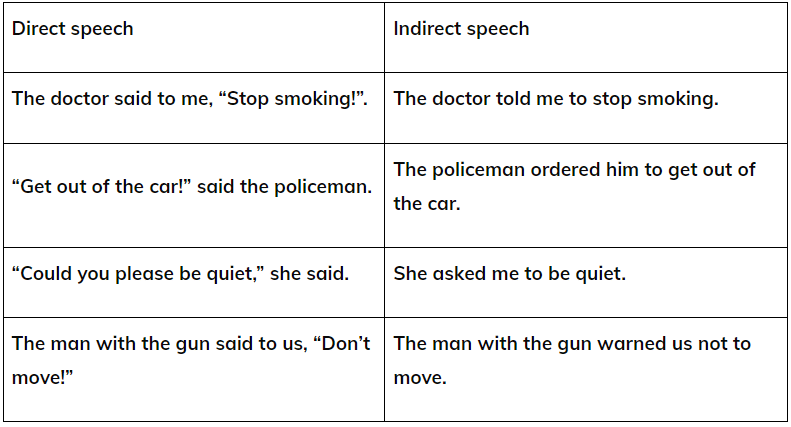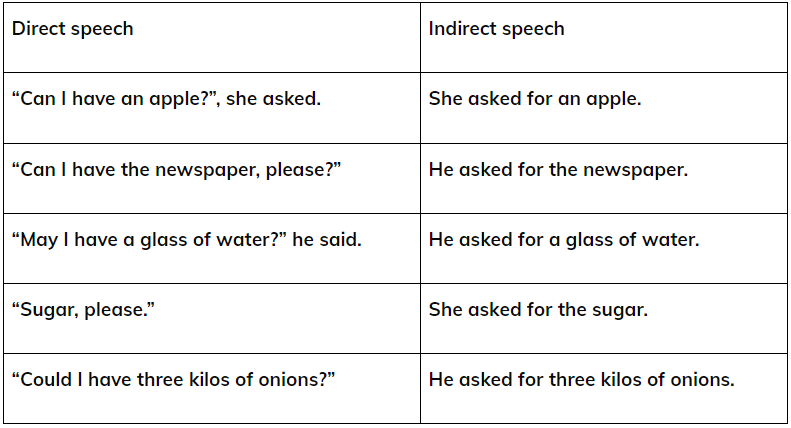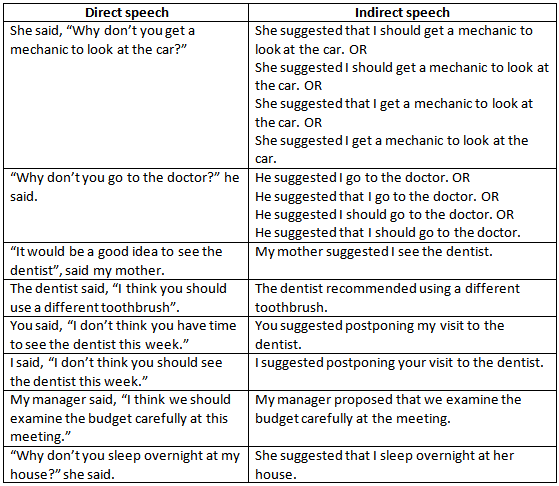Reporting Commands & Statements | English Grammar for Class 9 PDF Download
Understanding the meaning of the definition
Here reported speeches play an important role. A speech which reports the actions of a person is termed as Reported Speech. There are different things to explore here and for that you need to give attention to all the sections carefully.
Types of Reported Speech
There are various types of reported speech and each type is unique in its own way. Understanding each type helps to you to make various comparisons in a better way. The types which we will be discussing here are associated with commands, requests, statements and questions.
Reported speech Explanations
There are various kinds of reported speech and a student needs to go through each type to get the complete picture. Checking the explanations is as important as preparing for the final exam. You cannot afford to miss a single point. After you go through the explanations all your queries or confusions related to will be cleared. Here we have tried to explain each type with examples and you must observe the points carefully while checking the examples.
Reported Speech: orders, requires & suggestions
When we want to report an order or request, we can use a verb like ‘tell’ with a toclause: He told me to go away. The pattern is verb + indirect object + to clause. The indirect object is the person spoken to. Other verbs used to report orders and requests in this way are: command, order, warn, ask, advise, invite, beg, teach, & forbid.
Examples:

Requests for objects
Requests for objects are reported using the pattern “asked for” + object.
Examples:
Suggestions
Suggestions are often placed by using the verbs suggest, insist, recommend, demand, request, and propose followed by a that clause. ‘That’ and ‘should’ are optional in these clauses, as shown in the first two examples below. Note that suggest, recommend, and propose may also be followed by a gerund in order to eliminate the indirect object (the receiver of the suggestion) and thus make the suggestion more polite. This usage of the gerund is illustrated in the fourth and fifth examples below.
Examples:
(i) When we report questions, the subject comes before the verb.
- Direct speech: “Where are you going?”
Reported speech: He asked me where I was going. - Direct speech: “Why is he shouting?”
Reported speech: He asked me why he was shouting. - Direct speech: “What do you want?”
Reported speech: She asked me what I wanted.
(ii) When reporting questions we don’t use the auxiliary verbdo, except in negative questions.
- Direct speech: “Who doesn’t like cheese?”
Reported speech: She asked me who didn’tlike cheese.
(iii) We report yes/no questions withif or whether.
- Direct speech: “Do you want me to come?”
- Reported speech: I asked him ifhe wanted me to come.
- Direct speech: “Have you fed the dog?”
- Reported speech: She asked me whetherI had fed the dog.
(iv) When we report questions withwho, what or which + to be + object, the verb be can come before or after the object.
- Direct speech: “Who is the champion?”
- Reported speech: She asked me who the champion was/ She asked me who was the champion.
- Direct speech: “What is your favourite colour?”
- Reported speech: She asked me what my favourite colour was/ She asked me what wasmy favourite colour.
Reporting statements is relatively easy. The most common verb used to report statements is tell.
As a general rule, the changes in the tense of the reported speech depend upon the tense of the reporting verb in the direct speech. Thus when the reporting verb is in the past tense, the tense of the reported verb also changes to past tense.
Example:
- He said, ‘I want to go.’
He said that he wanted to go.
While reporting statements use a verb like tell.
- Direct: He said, ‘I may meet you tomorrow.’
- Indirect: He said that he might meet you tomorrow.
- Direct: He said, ‘I will marry you only if you mend your ways.’
- Indirect: He said that he would marry her only if she mended her ways.
- Direct: He said, ‘I have decided not to buy the house because it is off the main road.’
- Indirect: He said that he had decided not to buy the house because it was off the main road.
- Direct: He said, ‘Ladies and gentleman, we must make this decision here and now.’
- Indirect: He told his audience that they must / would have to make that decision there and then.
- Direct: He said to his friend, ‘I have been worried about my daughter for some time. She is getting thinner and thinner.’
- Indirect: He told his friend that he had been worried about his daughter for some time and that she was getting thinner and thinner.
|
25 videos|90 docs|41 tests
|



























